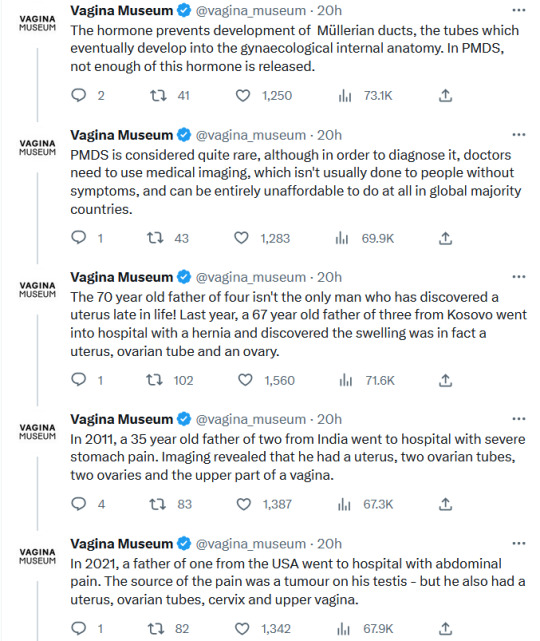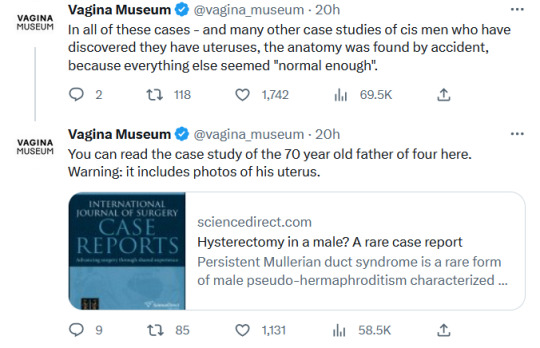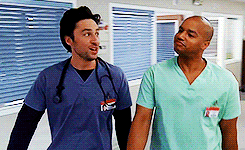Text
It says a lot about our society that vaccines are controversial but an injectable diabetes drug being used off label for weight loss was immediately accepted by everyone without a second thought
#ive also heard of someone who got an UNLABELLED vial of it#like you literally dont know what youre putting in your body#but sure if it might maybe help you to lose weight its fine right#because we should do anything and put our bodies at severe risk just to be thin#ozempic#semaglutide#weight loss#medicine
6K notes
·
View notes
Text
Quote of the day:
"Consultants still ask for help when we don't know. We just don't call it that, we call it 'making a referral'"
48 notes
·
View notes
Note
Do you know your blood group and if yes how did you find out?
- yes, found out by donating blood
- yes, found out by receiving blood
- yes, found out by testing for a job
- yes, found out by testing for a medical reason
- yes, found out in another way (say in tags)
- no, I don't know my blood group
#i do love the indignant tags of people saying how do people not know it's on your birth certificate#1. not everyone has/has seen their birth certificates#2. it's not on birth certificates in certain countries#also i found out you can do at home tests in some places/people did it at school?!?#anyway I found out by donating blood
1K notes
·
View notes
Text



https://twitter.com/vagina_museum/status/1628046312275935232
81K notes
·
View notes
Text
Me watching with pride as the blue cannula I got into a tiny vein doesn't tissue even after 4L of fluid boluses

#top achievement of the night#got a litre through in 15 minutes and managed 2 antibiotic doses as well#medblr#medicine#emergency medicine#help im a doctor
19 notes
·
View notes
Text
When your patient insists on walking from the waiting room and then you diagnose them with a broken vertebra

#ohhhh that reminds me of the time the nurse in charge and I were on each end of a man's nipple piercing#trying desperately to remove it#this man had been transferred for the day to our hospital for the sole reason of doing a cardiac MRI#and we were NOT letting it fail#medblr#medicine
18 notes
·
View notes
Text
When your patient insists on walking from the waiting room and then you diagnose them with a broken vertebra

#this is why you do a full examination people#and examine all the way down the spine when someone has fallen#even if they say their back is a bit achey and their main issue is the huge knee haemarthrosis#luckily it was stable and ortho said she could mobilise and go home#medicine#medblr#emergency medicine#help im a doctor
18 notes
·
View notes
Text
not cluttering up the reblogs on that one post but people on tumblr/twitter are so fucking weird about post covid syndrome.
namely there seems to be an assumption that if you get long covid, it's because you are an able bodied person who just "wasn't careful enough" and "went back to normal" and "hates disabled people." lots of posts celebrating that the assumed able bodied long covid patient "knows what it's. like now" and "woman who voted for the leopards eating people's faces party now has the leopards eating her face"
i shouldn't have to tell people that i was already immunocompromised or that i caught covid from a family member who went to a party. i shouldn't have to have my own behavior interrogated for like. times i took off my mask to take a sip of water, or times i hugged a friend. for people to determine whether i deserved multisystem inflammatory syndrome, to suffer lifelong multisystem organ and nerve damage, to lose the ability to walk unaided, to lose the career i'd spent years training for, to be 27 and have no idea what my future is going to look like or even how long of a future i have given everything. and you know what? even if a person who believed the CDC when they said that covid was over experienced this? they'd still deserve access to medical care and disability supports.
17K notes
·
View notes
Text
A busy, exhausting first 3 days on A&E but I am absolutely buzzing
I've missed this feeling
#actually feeling productive and diagnosing and seeing treatment effects#and the staff are friendly like nurses have already learnt my name???#6 months on the last ward and genuinely dont think the nursing staff knew me from any of the other doctors#anyway i know theres still gonna be some tough shifts and difficult patients and there already have been#but as long as theyre the minority this placement is going to be great#medicine#medblr#help im a doctor
12 notes
·
View notes
Note
Hi! I'm a clinical medical student on placement. I've been recently struggling with getting flashback (blood) into cannulas and vacutainers and struggle to ascertain patient veins. Do you have any advice about how I can get blood into cannulas/vacutainers and palpate patient veins. I'd be very grateful.
Oh man I HATED cannulas as a med student, although I had the opposite problem, where I would get flashback but couldn't advance and fully site the cannula.
Also apologies for the delay on replying to this, it's been a busy end of placement to get things sorted haha
My tips would be:
take your time with EVERYTHING.
Make sure you've got all your equipment set up and to hand, because just slightly turning to try and pick up the blood bottles or flush or something can cause a slight movement in the needle and cause it to come out of the vein. Similarly take your time selecting the best vein and also advance the needle slowly - it's difficult to judge how deep the vein is just by palpating, especially if its in the ACF, so it's easy to get flashback but advance too far. Stop at the first sign of flashback then advance a small amount (about 1cm unless you're inserting a widebore cannula) to ensure the entire needle tip and cannula tip are in the vein, but haven't gone through the other side.
Also get yourself and the patient into an optimal position. I can guarantee this helps, because the cannulas I most commonly missed are ones where I'm slightly at an angle, trying to get around stuff around the bed, or have tried to do it without the patient's arm being fully straight. Get a second pair of hands to help position the patient if they aren't able to do it themselves. It's not a failure or sign you're bad at cannulas if you have to do this, and means you're more likely to get it first time so that's better for the patient
Rest added under the cut
2. Get the skin taut
Especially with older people who's skin has list some of the collagen, or if the patient is dehydrated. Palpate where the vein is when you've got the skin taut and keep it there. Veins can wriggle especially when trying to get a needle in them, but they move when the skin is pulled so there's no point palpating unless you've got the vein in the position you're going to approach it from
3. Tap, use alcohol wipes and gravity
The hand veins can pop up really nicely with a bit of encouragement. Get the tourniquet close to the hand, get the patient to open and close their fist and dangle their hand over the side of the bed for a bit to get the veins nice and juicy.
4. Think about anatomy
You don't always need to go in the middle of the ACF - I like to feel in the lateral or medial parts because the veins can be more palpable. Also people often have a nice one running from the thumb joint along the back of the hand over the wrist (it's often nice and straight and doesn't have valves/confluences with other veins) image below for demonstration:

5. Don't automatically get a smaller gauge needle
It's tempting to think oh I'll use a blue because the veins are small/difficult, but actually you're more likely to miss with a smaller one and it's more likely to clot when trying to take blood off, and less likely to be properly in the vein if it's deeper.
That's all off the top of my head but basically it's just doing them over and over again until it feels natural and easy. Also US guided is great but I'd recommend not just immediately learning and relying on US because it's slower, there's not always a machine around and it's fiddly (also it does feel really satisfying getting a tricky one in without the US). Get good at it without ultrasound then add that skill to your repertoire later :)
If anyone else has tips feel free to add on!
16 notes
·
View notes
Text
(Audio)Book Review
Geneva - Richard Armitage

Rating: ⭐⭐⭐⭐⭐
Blurb: Nobel Prize-winning scientist Sarah Collier has started to show the same tell-tale signs of Alzheimer’s disease as her father: memory loss, even blackouts. So she is reluctant to accept the invitation to be the guest of honour at a prestigious biotech conference – until her husband Daniel, a neuroscientist, persuades her that the publicity storm will be worth it. The technology being unveiled at this conference could revolutionise medicine forever. More than that, it could save Sarah’s life.
In Geneva, the couple are feted as stars – at least, Sarah is. But behind the five-star luxury, investors are circling, controversial blogger Terri Landau is all over the story, and Sarah’s symptoms are getting worse. As events begin to spiral out of control, Sarah can’t be sure who to trust – including herself.
Review: I mainly downloaded this because a) it was free with my audible membership and b) I was obsessed with Spooks and Richard Armitage and Nicola Walker. This did not disappoint, it's gripping, there are plenty of twists some that I guessed and some that absolutely FLOORED me, it's told from several perspectives which was easy to follow and I need this as a film/tv series with those two playing the main characters. I don't know how to review this without spoiling but I always feel a good book makes you feel things about the main characters (whether that's positive or negative emotions) and I got so invested in this and yelled a lot at certain characters so it definitely ticked that box for me. It's not super science/biotech focussed and isn't sci-fi it's more an imagining of medical tech that is not currently available but could be soon. Apparently it was originally written to be an audiobook but I think there is a print version, I don't know if that would affect it in any way.
Trigger warnings: Alzheimer's dementia, mentions of assisted suicide, emotional abuse, murder, violence, gun violence, car accident, depiction of hallucinations and dissociative episodes
#bookblr#book review#richard armitage#geneva#in writing this post I also discovered he grew up very close to where I grew up and that he's gay
16 notes
·
View notes
Note
when did you get into med and how so? considering pivoting to nutrition / dietetics from gen ed rn
I became interested in medicine when I was about 15, I'm not really sure what drew me to it other than I was really into science at school, mostly chemistry/biology. I wanted to do forensic science initially, but then I don't know what switched but I liked the idea of diagnosing with gathering information etc with the added practical parts of medicine, so I started to volunteer in healthcare associated settings, and got work experience and just went from there!
I started med school in 2014, I went straight from secondary school but was close to taking a gap year. Despite the downsides I know I made the right choice, even more so when I actually start my chosen specialty properly! It's not for everyone and I don't think I appreciated what working as a doctor would be like until I started working, even med school is very different to the actual job, and it's definitely fine to change your mind and no shame in 'dropping out'
1 note
·
View note
Note
Hi! I'm a clinical medical student on placement. I've been recently struggling with getting flashback (blood) into cannulas and vacutainers and struggle to ascertain patient veins. Do you have any advice about how I can get blood into cannulas/vacutainers and palpate patient veins. I'd be very grateful.
Oh man I HATED cannulas as a med student, although I had the opposite problem, where I would get flashback but couldn't advance and fully site the cannula.
Also apologies for the delay on replying to this, it's been a busy end of placement to get things sorted haha
My tips would be:
take your time with EVERYTHING.
Make sure you've got all your equipment set up and to hand, because just slightly turning to try and pick up the blood bottles or flush or something can cause a slight movement in the needle and cause it to come out of the vein. Similarly take your time selecting the best vein and also advance the needle slowly - it's difficult to judge how deep the vein is just by palpating, especially if its in the ACF, so it's easy to get flashback but advance too far. Stop at the first sign of flashback then advance a small amount (about 1cm unless you're inserting a widebore cannula) to ensure the entire needle tip and cannula tip are in the vein, but haven't gone through the other side.
Also get yourself and the patient into an optimal position. I can guarantee this helps, because the cannulas I most commonly missed are ones where I'm slightly at an angle, trying to get around stuff around the bed, or have tried to do it without the patient's arm being fully straight. Get a second pair of hands to help position the patient if they aren't able to do it themselves. It's not a failure or sign you're bad at cannulas if you have to do this, and means you're more likely to get it first time so that's better for the patient
Rest added under the cut
2. Get the skin taut
Especially with older people who's skin has list some of the collagen, or if the patient is dehydrated. Palpate where the vein is when you've got the skin taut and keep it there. Veins can wriggle especially when trying to get a needle in them, but they move when the skin is pulled so there's no point palpating unless you've got the vein in the position you're going to approach it from
3. Tap, use alcohol wipes and gravity
The hand veins can pop up really nicely with a bit of encouragement. Get the tourniquet close to the hand, get the patient to open and close their fist and dangle their hand over the side of the bed for a bit to get the veins nice and juicy.
4. Think about anatomy
You don't always need to go in the middle of the ACF - I like to feel in the lateral or medial parts because the veins can be more palpable. Also people often have a nice one running from the thumb joint along the back of the hand over the wrist (it's often nice and straight and doesn't have valves/confluences with other veins) image below for demonstration:

5. Don't automatically get a smaller gauge needle
It's tempting to think oh I'll use a blue because the veins are small/difficult, but actually you're more likely to miss with a smaller one and it's more likely to clot when trying to take blood off, and less likely to be properly in the vein if it's deeper.
That's all off the top of my head but basically it's just doing them over and over again until it feels natural and easy. Also US guided is great but I'd recommend not just immediately learning and relying on US because it's slower, there's not always a machine around and it's fiddly (also it does feel really satisfying getting a tricky one in without the US). Get good at it without ultrasound then add that skill to your repertoire later :)
If anyone else has tips feel free to add on!
16 notes
·
View notes
Text

#the same goes for people who say that childbirth/pregnancy shouldnt have medical intervention#what did people do before caesarean etc?#they died#babies and mothers died in their millions
37K notes
·
View notes
Text
Doctor: Different specialties have different personalities, and I’m going to prove it. Is anyone here interested in orthopedics?
*Student raises hand*
Doctor: I suppose you didn’t bring anything to take notes with.
Student: … no, I didn’t.
#ahahahaha#but also there is a lot of published research about personality types and traits and specialty#its very interesting
122 notes
·
View notes
Text
Acute medicine ended as it started:
Endless jobs and leaving 40 minutes late
Bring on A&E

11 notes
·
View notes
Text

A dramatic sunrise this morning was quite fitting for my last medical night shift
So glad to be done with medical on calls, just two shifts to go and I'm off to A&E
#it was a decent shift overall#so ready for a&e though#medblr#help im a doctor#the colour has not come out brilliantly through the window but it was pretty cool
8 notes
·
View notes